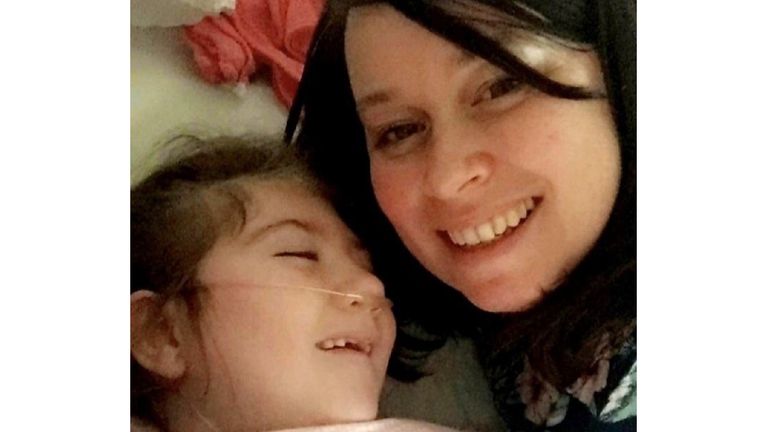
The parent of a disabled child says she will “freeze” to keep her daughter alive this winter as she faces a £7,000 energy bill, with families resorting to desperate measures to survive the cost of living crisis.
Another father said he is skipping meals to ensure his autistic son has enough to eat – and has lost five inches off his waistline.
“Frightening” new data from the Office for National Statistics (ONS) reveals that 55% of people living with disabilities are finding it difficult to afford energy bills and 36% struggling to cope with housing payments (rent or mortgage).
This compares to 45% of their non-disabled counterparts struggling with energy bills, and 30% having difficulty with housing costs.
Around one in 15 (7%) of disabled adults are behind on their energy bills, compared to one in 25 (4%) non-disabled people, according to the ONS.
Meanwhile, one in 25 (4%) disabled adults are behind on their rent or mortgage payments – twice as many as their non-disabled counterparts, with one in 50 (2%) behind on housing costs.
Families of those living with disabilities have become increasingly desperate amid the crisis.
‘I will freeze to keep my daughter alive’
A mother said she will freeze this winter after her energy bill surged beyond £500 a month – the majority of which is used to power life-saving equipment for her disabled daughter.
Carolynne Hunter, from Tillicoultry in Scotland, fears her annual bill hit will £7,000. She is being urged by her energy company to increase her direct debit to £700 a month, which she said she is refusing to do.
“I just can’t afford it,” she told Sky News.
“And I work full time, I am working 40 hours a week, so I have more money coming in than most.”
Her 12-year-old daughter, Freya, requires round-the-clock intensive care at home. She is oxygen-dependent and requires a track and hoist, a powerchair, an electric bed and an electric bath.
Freya is unable to regulate her own body temperature, so requires constant heating in the winter.
This winter Ms Hunter will turn off the heating in every room except Freya’s – and said she and her other daughter will “freeze”.
But, Ms Hunter told Sky News, she has no choice if she wants to keep her daughter alive.
“I don’t matter, do I?” she said, adding: “People who have disabilities are just not going to be able to pay for these bills and they’re not going to survive.
“If you’re cold for a long period of time and you have an illness, you’re going to get hypothermia.
“And you can imagine the mental health of people – my mental health isn’t too great at the moment because I am sitting in a freezing cold living room every night.”
Skipping meals to feed his son
Paul Ridley, 57, has been skipping meals to ensure food stays on the table for his family, including his son Keith, 33, who has autism and is non-verbal.
The ensuing weight loss, increased by stress, has seen Mr Ridley drop from a waist size of 32ins to 28ins.
He said: “You’re always worried about the shopping – for example, a normal shop would get you about four or five bags.
“Now it’s around three.”
He added: “Carers are the unpaid army of this country. If we go down and cannot care, it’s going to cost the government more money.”
Read more on the cost of living crisis
Mike O’Brien, who is a full-time carer for both his elderly and disabled parents, said his family’s grocery bill has gone up by £30 a week – despite continuing to order the same food.
He said one of the issues was trying to deal with rising prices on a fixed income. It comes amid calls for the government to increase benefits in line with inflation, with warnings “lives will be lost” if it doesn’t.
“When things are constantly going up and up, all of a sudden you realise [your benefits] are not going to last that long,” Mr O’Brien said.
Read more: Which low-cost grocery products have gone up in price?
Energy bill surged by 50%
Dan McEvoy and his wife are full-time carers to their nine-year-old daughter, Elisa, who lives with cerebral palsy and is registered blind and deaf.
The 46-year-old dad of two said “everything is more expensive” when it comes to caring for someone with a disability – from spending more on fuel to get to hospital appointments, to needing to run the washing machine more often.
Last year, Elisa spent eight months in hospital. Since coming home, the family’s energy bill has surged by 50%.
“Over half our energy usage comes from what we need to keep Elisa alive and comfortable,” Mr McEvoy told Sky News.
Amid the risk of blackouts, he added that “without electricity, Elisa would need to be hospitalised”.
“The biggest frustration for us is every time we seem to be making any headway and promoting the idea that parents of disabled children are disproportionately impacted by this, there is a new prime minister.
“So it’s like starting again from scratch.”
Risk of death at home
James Taylor, from disability equality charity Scope, said today’s figures were “frightening” and the charity’s helpline had been “inundated with calls”.
“Scope has heard from so many disabled people who are having to choose between being warm and powering life-saving equipment,” he said.
Richard Kramer, Sense chief executive, added: “Many disabled people face higher energy bills due to needing to power essential equipment such as wheelchairs, hoists and feeding machines, or have to shoulder the costs of specialised therapies and diets.
“The latest ONS data is just further proof of how badly disabled people are struggling through this cost of living crisis.
Click to subscribe to the Sky News Daily wherever you get your podcasts
Both charities are calling on the new prime minister, Rishi Sunak, to uprate benefits in line with inflation.
Dan White, from Disability Rights UK, said: “We are reaching a point in the cost of living crisis where without urgent intervention from the government, disabled people will be at risk of serious deterioration in their health, and at worst death in their homes”














